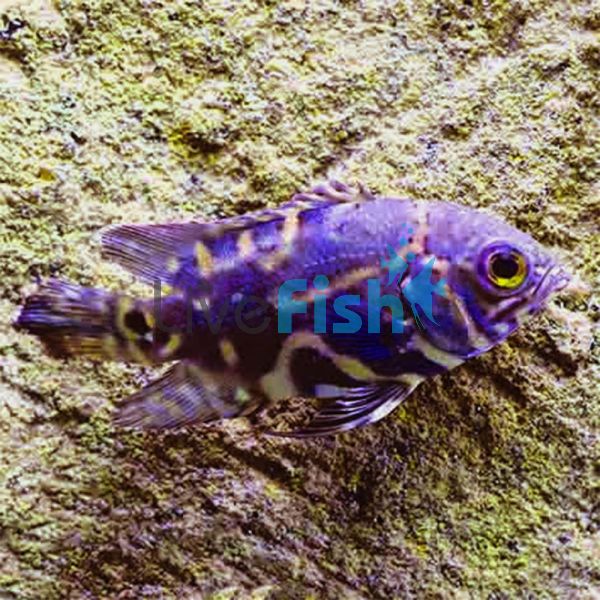Oscar - Wild 4cm
Please note that the colouration of this fish is from the blue lighting above the tank.
The fish are standard Wild oscar colours.
Captive-bred Oscars are plentiful in the aquarium hobby coming in a range of colour variations as well. The captive-bred fish also sports enthusiastic, wet pet-like personalities which brings up the question “why consider a wild oscar?” The wild-caught Oscar preserves all of the original colours and behaviors specific to this fish which often can be vastly different from the multi-generational captive-bred Oscars. For aquarists looking for a true natural-looking fish then the wild Oscar does not get any better.
Oscar - Wild
Captive-bred Oscars are plentiful in the aquarium hobby coming in a range of colour variations as well. The captive-bred fish also sports enthusiastic, wet pet-like personalities which brings up the question “why consider a wild oscar?” The wild-caught Oscar preserves all of the original colours and behaviors specific to this fish which often can be vastly different from the multi-generational captive-bred Oscars. For aquarists looking for a true natural-looking fish then the wild Oscar does not get any better.
Though the body shape of wild Oscars is still the same as captive-bred fish, the colouration is vastly different. Wild Oscars carry more shades of greens and browns with bold, jet-black patterning through the body and fins. The number of red scales is far less compared to captive-bred fish and in some cases may be non-existent aside from the tail spot.
The personality of a wild Oscar may not be as ‘puppy dog’ like in comparison to captive-bred fish, however, these fish are incredibly intelligent and will still have a high chance of showing this behavior. They may also be timider and show a slightly more territorial behavior as well with tank mates.
Trying to find the males and females in this species is very difficult in comparison to other South American cichlids. There are no immediate distinguishing factors between male and female Oscars and it is best to let them pair off naturally. However, because they are territorial fish it is difficult to house multiple Oscars in an aquarium without it being very large. naturally, the wild Oscars are found in the amazon river of South America.
Tank Recommendations for your Wild Oscar
Wild Oscars are big fish, growing to around 30 cm long, and are also considered to be messy fish. Because of this, it is best to keep them in a tank that is a minimum of around 380 liters. Though the internet may show recommendations for smaller tank volumes, in the long run, this can be detrimental to the fish as maintaining proper quality in smaller tanks with a full-grown Oscar can be very difficult. This size tank will not only allow for a full-grown adult tiger Oscars but the possibility for other tank mates.
The aquascape for an Oscar should be taken very lightly as these are big and often clumsy fish. They regularly scratch themselves and bump into scaling materials which could cause unnecessary injury so it is best to keep them on a sand or gravel substrate with a few smooth river rocks and some driftwood to mark out territorial boundaries. Since wild Oscars come from dimly lit environments it may be best to replicate this in the early days of introducing the fish into your aquarium. Once it settles in the lighting can slowly be made brighter.
Suitable Tank Buddies
Wild Oscars are big, boisterous fish which can be very territorial. Though an oscars behavior can range from slightly aggressive to highly aggressive, caution should be taken when they are kept with other fish because Oscar's voracious personality and feeding response can mean they outcompete tank mates for food.
Usually Compatible
Large growing South American cichlids such as jaguar cichlids, red devil cichlids, Veija cichlids and species on a similar sort can be housed with oscars.
Sometime Compatible
Geophagus, silver dollars, flag tail prochilodus and other large growing fish species.
Rarely Compatible
Peaceful aquarium species and nano fish such as tetras or shrimp will become immediate food for the Oscar.
Feeding your Wild Oscar
This wild caught fish can be finicky to get feeding on prepared aquarium foods, there should not be much of an issue with wild oscars. They have a voracious appetite and should take to pellets quite quickly. Their diet should contain good quality floating or sinking pellets with high a protein content.
This should be supplemented with frozen foods such as bloodworms. One thing to note is that they are messy eaters so feeding flakes might not be a good option. Over feeding oscars is a common problem, this not only causes poor water quality but can also lead to long term negative health effects for the oscars as well, so it should be avoided.
| Scientific Name | Astronotus Ocellatus |
|---|---|
| Care Level | Moderate |
| Common Names | Oscar, wild tiger Oscar |
| Diet | Carnivore |
| Fish Family | Cichlidae |
| Lifespan (years) | 15 |
| Max. Length (cm) | 30 |
| Min. Tank Volume (l) | 380 Litres |
| Origin | South America |
| Reef Safe | With Caution |
| Sociability | Aggressive |
| Venomous | No |
| Water Conditions | 24-28° C, pH 6.0-7.0 |





Hi, The fish is black, the blue is reflecting from the Aquarium lights :)
This is one of the Wild Oscars that we have had come through not the one you will receive.